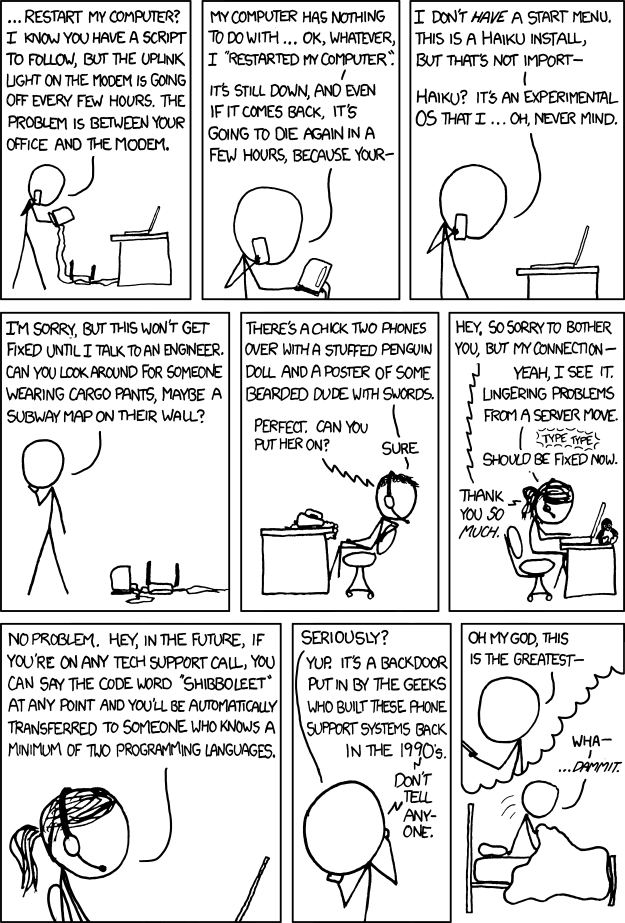Respect? That’s sheer terror. If you’ve rebooted and the problem remains, you have an actual problem they need to troubleshoot.
“Have you rebooted twice? Have you rebooted fifteen times?”
- Crowdstrike Technical Support
The best part is rebooting 15 times actually does fix the issue sometimes.
As a tech enthusiast, this doesn’t surprise me one bit; one of my most used repair techniques is to do nothing and wait. A lot of problems just go away by themselves. But I’m still very curious how the 16th reboot was fixing that bluescreen.
I think the reasoning was that there was a race condition between the code causing the bluescreen and the code updating to avoid the bluescreen so rebooting 15 times would give a lot of opportunities for the updater to win the race.
But if it was a race condition, then some computers would just boot normally. I didn’t see anyone report that the issue was happening selectively. And that wouldn’t even be fix, just a one-off boot. Unless the file is removed the issue will come back on next reboot.
It’s probably one central server controlling access to the network or distributing images or something. So they need to reboot one machine in that cluster enough times and all of the machines in the cluster will work.
The vulnerability broke every machine, the fix was the one that took multiple reboots to apply.
I’m not sure we are talking about the same issue. In case of CrowdStrike, the update pushed a botched file that crashed the kernel on boot. Until the file was removed, the machine wouldn’t even boot to be patched.
Yes, that’s what I’m talking about.
I’m saying that in production, the screens and whatnot probably aren’t fetching that file on boot, they’re probably pulling from some central server. So in the case of an airport, each of those screens is probably pulling images from a local server over PXE, and the server pulls the updates from CrowdStrike. So once you get the server and images patched, you just power cycle all of the devices on the network and they’re fixed.
So the impact would be a handful of servers in a local server rack, and then remote power cycle. If they’re using POE kiosks (which they should be using), it’s just a simple call to each of the switches to force them to re-PXE boot and pull down a new image. So you won’t see IT people running around the airport, they’ll be in the server room cycling servers and then sending power-cycle commands to each region of the airport.
Your server also had to be patched for that to work I think.
The trick is to sleep, have an issue? Take a nap and come back to find it working somehow
Nah. The best solution is to shut down, unplug it, wait 10 seconds, plug it back in, then boot it back up. A good tech will say 30s or even a minute, because they know you’re not going to count the 10 seconds.
The goal here is to clear the capacitors, most of which will drain within that 10s.
How many times did you reboot it?
I love that Lemmy is the kind of place where this video series will still get referenced
We never believe you. We use to, but thirty of your coworkers lied to us about trying the troubleshooting problems so we don’t believe anyone anymore
Not in IT, but in software dev and I have some of the same issues dealing with support calls. I usually start off with “I’m sure you’ve tried some of this, so sorry in advance but can you… <insert super basic troubleshooting shit here>”. Seems to always get them to humor me and try doing things like restarting the computer and/or software.
Did call centre work for years and per policy we had to try and get screen sharing set up (had to keep a specific fruity tech company happy since they spent so much money buying a company that made screen sharing software). I’d always do the same thing each and every call.
-Ask if they rebooted. Listen to them lie to me that they did right before calling me.
-Set up screen sharing.
-Query the system and see it currently has a 184 day uptime.
-Force a reboot while questioning my lifes goals.
Yup.
And don’t feel offended if they ask if you’ve plugged it in, that’s a really common problem even with people who claim to have rebooted their computer. For some reason, people like to make arriving at a solution harder, maybe they just want some companionship, idk.
System uptime: 38 days
“I pressed the power button, and the screen went black then I pressed it again and the computer turned back on.”
Hmmmmmmmm.
Did they sleep and then wake the computer, or did they just power off the monitor?
I can guarantee you, they do not feel any sort of respect for you, they just immediately think you are a liar and now they have to waste time convincing you to do the restart, because 99% of the time, they’re talking to a liar that didn’t restart.
Just restart the computer for them, don’t make them waste time, metrics, and social battery trying to convince you to follow the process you both know you need to go through together.
opens task manager Ah… Looks like the restart didn’t take. Let’s try another one, just to be sure…
But if you betray that trust expect to be treated worse.
Shibboleet. That is all.

Anyoke tried it? Xkcds are pretty well known
They have to tell you to do it again anyways. If they don’t follow the script flow they’ll get in trouble.
Or we can see the actual uptime of your device and know you just put it to sleep/turned off a monitor.
That’s true. I always forget that’s in the system.
Windows will just straight up lie too
I wouldn’t really call it lying, because in the eyes of the computer it never shut down, it’s an intended “feature”: shutting down doesn’t actually cold stop the system, by default it has what is called hybrid shutdown or fast boot. When you click shutdown it saves your current kernel and running drivers into the hibernation file, so when you power back on it just loads that instead of having to start everything again and then reinits the drivers as if they were just started. This speeds up the process, but also can cause issues along the way.
You need to either shut it down using the /s flag in cmd prompt, or actually select restart. It’s super obnoxious and outdated in a world where HDD’s are becoming outdated.
It’s the Microsoft way! Haha
There’s that, but people do lie as well.
Also, even if you’ve rebooted, you could still have some bad state in the HW. A good tech support person will have you shut down completely, wait a few seconds (they’ll ask you to check cables or something), then turn it back on so the capacitors can clear. Rebooting solves 90% of problems, this process solves most of what’s left.
IT support here. I hate hearing that on the phone.
It means my silver bullet that instantly fixes 90% of all problems has already been fired, and missed.
Also means I can’t use the reboot time to gather my thoughts, check documentation and google the error.It’s kinda fun when the problem persists after a reboot and you can instantly start flying through the settings or pasting commands into their powershell.
In my experience it means the customer is lying to you because they don’t want to reboot their computer.
Because then they’d lose their 14 concurrently open chrome webpages, 9 word documents, 7 large fully table-formatted excel files, and 6 instances of an application they haven’t closed…but IT needs to fix why their PC is running slow
Don’t act like many of us in IT don’t have 15 browser windows for two different browsers open most of the time, we just know that’s why our system is running like shit
You’d hate me then. I’m a software developer who did IT support for a couple years, so if I’m calling, it’s because I’ve exhausted all of the common problems.
BTW, shibboleet.
My internet goes out a few times per year. I run entry-level enterprise hardware (Ubiquiti APs + Mikrotik router), and I’ll do a full power cycle (power off, wait 30s, plug back in, etc) before calling in. I’ll have detailed diagnostics (e.g. can I ping the gateway, but not 1.1.1.1? traceroute logs saying exactly where my connection is failing, etc), and I’ll submit them through their online form entry before calling.
I’ve only gotten through their phone support once or twice. I think they recognize the number and just dispatch a team pre-emptively, because my internet is usually fixed within 10 min of sending that in (and I’ve waited up to an hour before). It’s a small ISP that only serves my small town (30-40k people), and they don’t have a monopoly, so I’m one of probably a few thousand customers and they probably only have one or two phone support people.
I’ve had one time when it was something I could fix (was a faulty cable), but every other time it’s been some kind of service disruption on their end.
No, I’d love that too. Cause I could instantly escalate your ticket away from my desk.
:)
No offense, but I want to talk to you about as much as you want to talk to me. I get through so many first level tech support calls by just overwhelming the person with information. I’m not trying to show off, I just want to save your time and mine.
I have a slightly different experience. I worked in IT in my job before this one and I could totally fix my own problem except they have my workstation locked down behind software restrictions, firewalls and admin access that I’m not granted so that I can’t perform the fairly simple fix.
So instead, I call support, wait 20 minutes on hold, and get tier 1 support. I explain the issue and all of the steps I’ve already taken and what actually needs to be done, and that I only need them to do it simply because they have admin access and I don’t. They then tell me, step by step, to do everything that I already said I had done while they mouth breathe at me on the phone. Then, when those things shockingly don’t fix the problem when done all over again a second time, they escalate it to teir 2 and tell me I will get a call back.
So I sit on my thumb for 30 minutes to several hours. Then get a call back from a nerd who recognizes a fellow nerd as I explain literally everything all over again (because teir 1’s notes are a single 5 word sentence like “user says the thing broke”) and says “oh, yeah, you’re right. We just need to do that. Here let me remote in and do that real quick. Done.” And now my problem is fixed. Thanks, Austin, you’re the best. Please can I have your direct line for the future, so I can skip this other nonsense? No? I get it, but damn.
This is my experience as well. Tier 1 is awful, and it’s a terrible job too.
I just came back from my IT department right now. I had to change my laptop battery and it took 1.30h to do it. The battery itself is extremely easy to replace. Open the lid, remove the old one and insert the new one. That’s it, right? You wish. My laptop bios is not compatible with this battery because it’s the 2.0 version, so I had to update it. But of course bitlocker didn’t agree with that. So I had to go bother them to update my bios, then restore the computer accepting that both bios and battery were safe, restart once more and check that it was all right.
I could have done all that by myself but I lack the permissions.
I’m opening task manager to see if you’re a liar.
And I’ll do it in front of you too. Might circle the up time with the cursor if it warrants it.
This works until you learn that 90+% of the time they haven’t actually restarted, or they thought they restarted but their OS has some stupid policy of sleeping instead of restarting on shutdown (looking at you windows with your hybrid shutdown crap). That being said, sometimes you also get people who know what they are doing, but because of this they miss the basics, because “there’s no way that is it” or they just don’t think of it. As such everyone who actually does the bare minimal troubleshooting has the same treatment.
I look at you in the eyes and check you’re uptime.
you’re
ಠ_ಠ
I ask if people have rebooted just as a conversation tool. I don’t ever trust what they tell me, it’s just a way to see how their thinking.
I’m adding this to my repertoire.
“my computer won’t turn on!”
“is it plugged in?”
“hold on let me check…it’s hard to see because the power’s out”
“…”
You’ve turned off your monitor and turned it back on.















